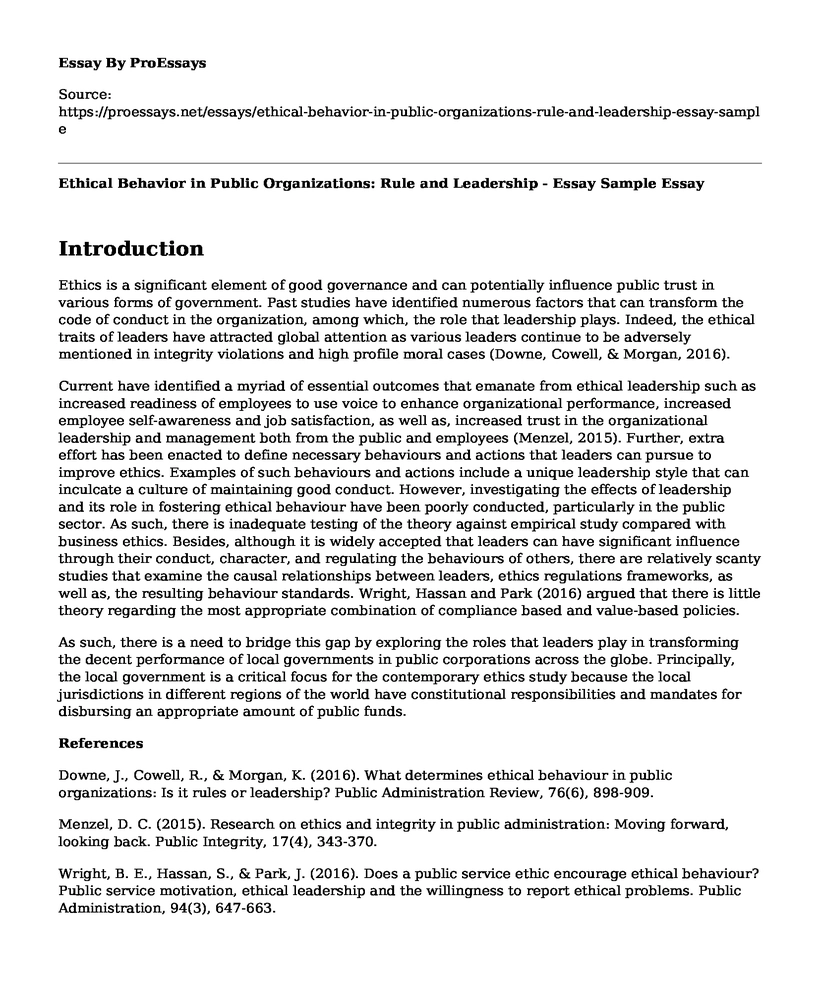Introduction
Ethics is a significant element of good governance and can potentially influence public trust in various forms of government. Past studies have identified numerous factors that can transform the code of conduct in the organization, among which, the role that leadership plays. Indeed, the ethical traits of leaders have attracted global attention as various leaders continue to be adversely mentioned in integrity violations and high profile moral cases (Downe, Cowell, & Morgan, 2016).
Current have identified a myriad of essential outcomes that emanate from ethical leadership such as increased readiness of employees to use voice to enhance organizational performance, increased employee self-awareness and job satisfaction, as well as, increased trust in the organizational leadership and management both from the public and employees (Menzel, 2015). Further, extra effort has been enacted to define necessary behaviours and actions that leaders can pursue to improve ethics. Examples of such behaviours and actions include a unique leadership style that can inculcate a culture of maintaining good conduct. However, investigating the effects of leadership and its role in fostering ethical behaviour have been poorly conducted, particularly in the public sector. As such, there is inadequate testing of the theory against empirical study compared with business ethics. Besides, although it is widely accepted that leaders can have significant influence through their conduct, character, and regulating the behaviours of others, there are relatively scanty studies that examine the causal relationships between leaders, ethics regulations frameworks, as well as, the resulting behaviour standards. Wright, Hassan and Park (2016) argued that there is little theory regarding the most appropriate combination of compliance based and value-based policies.
As such, there is a need to bridge this gap by exploring the roles that leaders play in transforming the decent performance of local governments in public corporations across the globe. Principally, the local government is a critical focus for the contemporary ethics study because the local jurisdictions in different regions of the world have constitutional responsibilities and mandates for disbursing an appropriate amount of public funds.
References
Downe, J., Cowell, R., & Morgan, K. (2016). What determines ethical behaviour in public organizations: Is it rules or leadership? Public Administration Review, 76(6), 898-909.
Menzel, D. C. (2015). Research on ethics and integrity in public administration: Moving forward, looking back. Public Integrity, 17(4), 343-370.
Wright, B. E., Hassan, S., & Park, J. (2016). Does a public service ethic encourage ethical behaviour? Public service motivation, ethical leadership and the willingness to report ethical problems. Public Administration, 94(3), 647-663.
Cite this page
Ethical Behavior in Public Organizations: Rule and Leadership - Essay Sample. (2022, Dec 12). Retrieved from https://proessays.net/essays/ethical-behavior-in-public-organizations-rule-and-leadership-essay-sample
If you are the original author of this essay and no longer wish to have it published on the ProEssays website, please click below to request its removal:
- Supply Chain Management in Thailand Essay
- Management Information Systems Essay
- Four Factors of Production in the Ecosystem - Paper Example
- Effect of Personality on Effective Nursing Leadership Paper Example
- Rhetorical Analysis Essay on Homelessness in United States
- Essay Sample on Motivation Theories Explain Aspects That Inspire Employees
- Free Report Sample on Organizational Change: Strategies, Challenges for Effective Implementation







